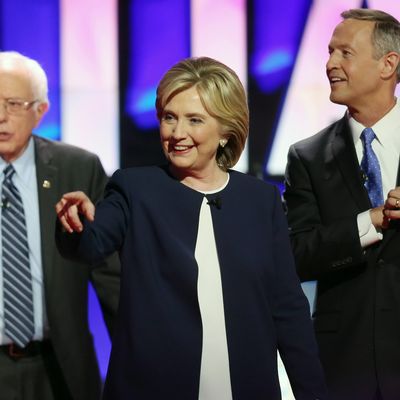
If you are accustomed to the sort of high-profile, crowded-stage slugfests the GOP debate series have mostly involved, it takes a little adjustment to get ready for a Democratic event, like the third tilt being held tomorrow at 8:30 p.m. EST at St. Anselm College in Manchester, New Hampshire. Most obviously, the three-candidate Democratic field means no “undercard” debate, no elaborate negotiations over the format, and no frantic arm-waving and rules-breaking to boost camera time. More subtly, the smaller field may actually complicate the strategic issues for the two viable candidates in a competition that resembles a chess game more than the GOP’s king-of-the-mountain struggle.
Here are five factors you should keep in mind before watching the Democratic tilt:
1. The relatively low viewership of a weekend debate places a premium on earned media spinoff.
Saturday night may be all right for fighting, as Sir Elton John once sang, but it’s not good for any televised event other than football. This means lower ratings, and consequently, a candidate wanting to move numbers needs a development that gets substantial media coverage, preferably one that gets discussed on the Sunday shows. Even a front-runner like Hillary Clinton could plan some pronouncement or zinger designed to dominate media descriptions of the event.
2. Nobody knows what ABC has planned for the debaters.
All ABC has vouchsafed to the rest of us about the debate is the names of the two moderators (David Muir and Martha Raddatz). We also know who is not going to be moderating: ABC’s own controversial George Stephanopoulos. The original co-sponsor, local TV station WMUR, is also excluded because it’s not behaving well in a labor dispute with its workers. But the format is a bit of a mystery, and so is the attitude of the moderators. Anyone who has watched the GOP debates knows this factor can be crucial. “Speaking of national security, Secretary Clinton, let’s talk about your responsibility for the deaths of Americans at Benghazi … ”
One wild card is whether the moderators — or, for that matter, any of the candidates — will get into the strange dustup that broke out today when the DNC “suspended” the Sanders campaign’s access to party voter files (an indispensable tool) to punish it for an earlier breach of HRC’s confidential voter-info database, which Team Bernie admits but calls an unimportant accident (the staffer responsible was promptly fired). Since Sanders is threatening to sue the DNC over the suspension, he could make a rude gesture in the direction of DNC chair Debbie Wasserman Schultz if she shows up in Manchester tomorrow night, but it’s hard to see exactly how it figures in a debate.
3. Does Bernie Sanders need to make a splash, or is he sneaking up on Clinton?
Everybody understands that the status quo in the Democratic contest, and its probable trajectory, is just aces with the Hillary Clinton camp. So the key strategic question is about Bernie Sanders. Does his camp feel that he has to change the dynamics of the race right now? If so, he probably needs a game-changer that moves the contest in his direction a bit more than expressing boredom with media attacks on Clinton for her private email server. He (with, perhaps, some help from Martin O’Malley) could broaden the beachhead established in the last debate by suggesting HRC shares too much of the GOP field’s taste for military interventions.
But it could be that Sanders’s grand strategy is to play the expectations game in Iowa, ride his field operation and voter enthusiasm to win in an upset or finish a “surprisingly strong” second, and then use the attention as a springboard to his strongest state, New Hampshire (Harry Enten at FiveThirtyEight suggests he could be in a decent position to do just that). If that is the case, the risk of a controversial debate remark — particularly if it is “divisive” — may outweigh the reward. Keep in mind there’s another Democratic debate on the horizon, on January 17, before Iowans caucus, and thus one more chance for Sanders to throw the long ball if that’s what circumstances dictate.
4. Who is debating whom?
Depending on how the moderators, well, moderate, one or more of the candidates could choose to ignore the rivals on the stage and debate the absent Republicans. This is a natural tactic for Clinton; if Sanders seems to be going after her, she can pick up some brownie points by turning the other cheek and then reminding Bernie and everyone else of the wolf at the country’s door. After all, even the most combative of the GOP debates often turned into a gala Obama- and Clinton-bashing session in which all of the candidates agreed that the unprincipled or inexperienced jerks to their left or right were infinitely preferable to any Democrat alive.
5. What kind of future would Martin O’Malley like to have?
Even if the moderators put big thumbs on the scale for the two viable candidates, and even if most Americans are off doing something else, the debate is going to give Martin O’Malley a lot more publicity than anything else he’s going to be doing for the holidays. He has a big choice to make. Does he make a lot of noise — by, say, making the criticisms of Hillary Clinton that Sanders has been so reluctant to make — in the hopes of boosting his Iowa poll numbers into the high single digits? Or since he probably doesn’t want to go back to Maryland and run for governor yet again, does he keep open the possibility of a nice cabinet post or major ambassadorship in a potential Clinton administration? He probably will not get to do both.






























